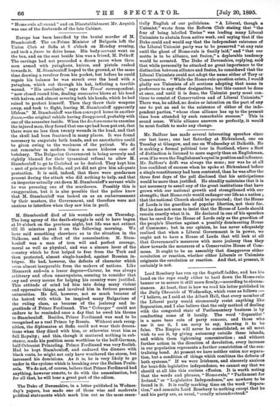Europe has been horrified by the brutal murder of M.
Stambouloff. The ex-Prime Minister of Bulgaria left the Union Club at Sofia at 8 o'clock on Monday evening, and took a flacre to drive home. His body-servant went on the box, and on the seat beside him was a friend, M. Petkoff. The carriage had not proceeded a dozen paces when three men armed with yataghans, knives, and pistols rushed towards it. M. Stambouloff leaped to the ground, at the same time drawing a revolver from his pocket, but before he could regain his balance he was struck over the head with a yataghan, which cut through his hats inflicting a terrible wound. "His assailants," says the Times' correspondent, "now closed round him, dealing successive blows at his head with knives, and almost severing both his hands, which he had raised to protect himself. Then they threw their weapons away, and took to flight, leaving M. Stambouloff apparently lifeless." M. Stambouloff was then conveyed home in another fiacre,—the original vehicle having disappeared, probably with one of the assassins inside. When the doctors came to examine the injured man, they found that one eye had been put out, that there were no less than twenty wounds in the head, and that the skull had been fractured in many places. It was found necessary to amputate both hands, and no amsthetics could be given owing to the weakness of the patient. We do not remember in modern times a more hideous case of butchery. The Bulgarian Government is being severely and rightly blamed for their tyrannical refusal to allow M. Stambouloff to go to Carlsbad as he desired. They kept him a sort of prisoner in Sofia, and yet did not give him adequate protection. It is said, indeed, that there were gendarmes present during the attack who did nothing to help, and that an inspector actually cut down M. Stambouloff's servant while he was pursuing one of the murderers. Possibly this is exaggeration, but it is also possible that the police knew that M. Stambouloff was looked on as an embarrassment by their masters, the Government, and therefore were not anxious to interfere when they saw him in peril.


































 Previous page
Previous page